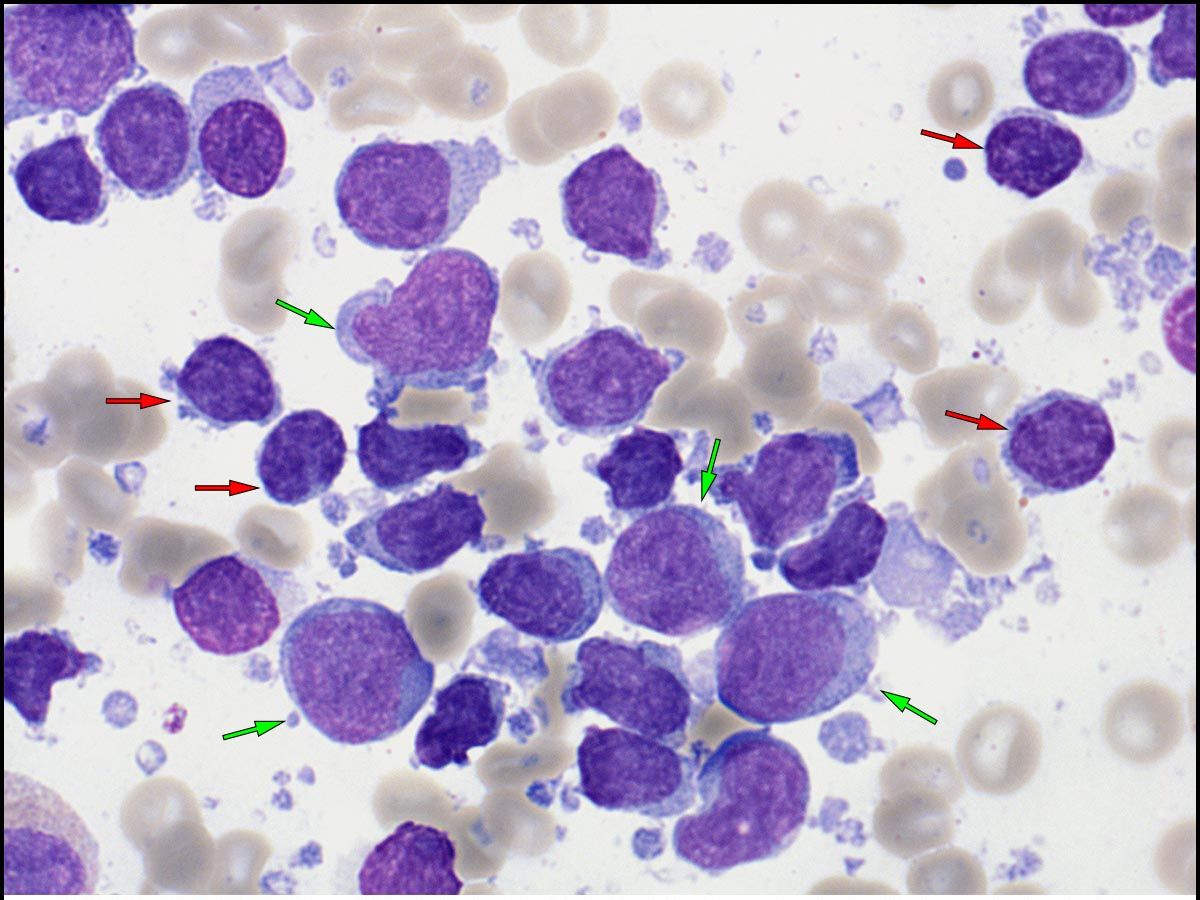- Center on Health Equity & Access
- Clinical
- Health Care Cost
- Health Care Delivery
- Insurance
- Policy
- Technology
- Value-Based Care
Lack of CD20 Expression Worsens Outcomes for Bispecifics in R/R DLBCL
Real-world analysis reveals that undetectable CD20 expression worsens outcomes for patients treated with epcoritamab and glofitamab bispecific antibodies for their diffuse large B-cell lymphoma (DLBCL).
Patients with undetectable CD20 expression had worse outcomes when treated with a bispecific antibody for diffuse largeB-cell lymphoma (DLBCL), according to an analysis of real-world outcomes that appeared this week in Blood.1
Of this study population, 156 were treated with epcoritamab and 89 received glofitamab; 113 were refractory to frontline therapy and 147 had received prior CAR T-cell therapy. | Image: Atlas of Haematological Cytology

Data from 245 patients show that 60% of those with relapsed or refractory (R/R) DLBCL were alive at 6 months following treatment with either epcoritamab (Epkinly; Genmab/AbbVie) and glofitamab (Columvi; Genentech), both approved bispecific antibodies targeting CD20.1
The results highlight how real-world results can differ from those seen in clinical trials. Although comparisons across studies are challenging due to variations in patient enrollment, phase 2 data for older patients with DLBCL in the EPCORE-DLBCL-3 trial (NCT05660967) showed epcoritamab yielded a progression-free survival (PFS) rate of 73% and an overall survival (OS) rate of 81% at 6 months.2 These data were presented in December 2024 at the American Society of Hematology.
Glofitamab, meanwhile, showed a 12-month PFS of 37% in a phase 2 trial published in 2022 (NCT03075696); the estimated 12-month OS was 50%. About a third of the 155 patients enrolled had prior treatment with chimeric antigen receptor (CAR) T-cell therapy.3
For the real-world analysis, study authors collected data from 12 institutions for patients receiving either bispecific antibody between January 1, 2023, and October 15, 2024. Among these patients, 156 were treated with epcoritamab and 89 received glofitamab; 113 were refractory to frontline therapy and 147 had received prior CAR T-cell therapy. Authors report that 174 of the patients (68%) would have been ineligible for registrational trials.
Results are as follows:
- The overall response rate (ORR) for epcoritamab was 51%, with 23% achieving complete response (CR), and 53% for glofitamab, with 30% CR
- Median PFS was 2.6 months (95% CI, 2.0-3.8), and the median OS was 7.8 months (95% CI, 6.2-11.0)
- The 6-month PFS was 36% (95% CI, 30%-44%) and the 6-month OS was 60% (95% CI, 54%-67%)
- Both trial ineligibility and undetectable CD20 prior to treatment yielded shorter PFS and OS; mong 17 patients with paired biopsies, 15 (88.2%) lost CD20 expression after bispecifics with a median time to progression of 3.7 months
“This analysis including R/R DLBCL patients shows the ORR to CD3/CD20 [bispecifics] was comparable to pivotal trials, although PFS and OS were lower,” the authors wrote. The results show the importance of target antigen expression in predicting outcomes, they said.
References
- Brooks TR, Zabor EC, Bedelu Y. Bottom of FormReal-world outcomes of patients with aggressive B-cell lymphoma treated with epcoritamab or glofitamab. Blood. Published online July 15, 2025. doi:10.1182/blood.2025029117
- Morschhauser F, Belada D, Duell J, et al. EPCORE DLBCL-3 first disclosure: fixed-duration epcoritamab monotherapy in older (≥75 y), anthracycline-ineligible patients with previously untreated large b-cell lymphoma. Blood. 2024;144(suppl 1):867. doi:10.1182/blood-2024-199271
- Dickinson MJ, Morschhauser F, Bachy E, et al. Glofitamab for relapsed or refractory diffuse large B-cell lymphoma. N Engl J Med. 2022;387(24):2220-2231. doi:10.1056/NEJMoa2206913
What Would Make Therapy Last? How About 2 Targets Each on B Cells and T Cells?
January 10th 2026The CEO of ModeX Therapeutics discusses MDX2003, a groundbreaking tetraspecific therapy that promises enhanced efficacy and safety in non-Hodgkin lymphoma treatment. This exchange appears in the January issue of Evidence-Based Oncology, the annual recap of the meeting of the American Society of Hematology.
Read More
